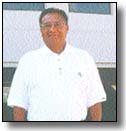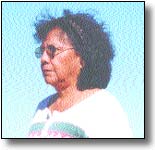|
Oct 6, 2001
By Jim Mimiaga Backed by 17 years of experience in tribal government, Ute Mountain Ute chairman Ernest House Sr. wants to continue the leadership role that his grandfather held 70 years ago and be re-elected Oct. 12. "We have come a long way since and what has been the key to that success is first understanding the treaties our forefathers negotiated and then fighting to see those rights become a reality for the Ute people," House said. "I think I have done that." During his watch as chairman for the past three years, House oversaw the final negotiations of the Animas La-Plata project, an off-stream reservoir near Durango that will hold 16,000 acre-feet of Ute water rights. "As leader I made sure I was educated on the issues of water treaties to make sure that Congress complies with our settlement acts," House said. "As a tribe we realized just identifying a water project to satisfy our rights was not enough. It took a lot of lobbying and determination to finally see funding allocated for it." House said the Utes future depends on young people defending tribal treaties with the United States. Understanding the tribe’s independent status as a sovereign nation and its relationship with the federal government is also important for the next generation, he said. But to do so does not mean sacrificing the traditional ways of the Ute people. "Whether it be dance and language, or our sacred ceremonies and prayer, Ute children need that exposure to our culture," House said. House said he wants to set up a commission to investigate whether an Indian school could be implemented in Towaoc. He sees that as a possible solution to improving the high dropout rate by students who feel disenfranchised with public schools because they are set up to teach the non-Indian world. "But it will not be like the old BIA boarding schools; those were disastrous for Ute people because there was too much focus on assimilation but nothing on culture and language," House said. "I’d like to see it done the right way so it is more balanced; otherwise the kids get bored and drop out." House said that he would pursue using the Montessori approach to education. The self-directed, experiential learning technique has been successful for the Southern Ute tribe and may work well for Mountain Utes because "it is a style of teaching that I feel Native Americans respond to better." In retrospect, House says that health-care issues deserve more attention from tribal government. Indian people are very susceptible to diabetes, so more prevention programs that teach nutrition and exercise are needed reduce its occurrence. Problems with alcoholism also need to be faced effectively, he said. Other issues he is interested in are researching compensation for Indian water rights that flow out of the state, more job-training for Utes to take over tribal enterprises, and teaching computer literacy to tribal members. "Things are looking good for Utes, but we must always stay ambitious and keep striving for our rights and economic development so our future is secure," he said. - - -
A thirst for knowledge and a sense of fairness during the government decision-making process are values former tribal chair Judy Knight-Frank brings to the Ute electorate. Knight-Frank, who served three terms as tribal leader until 1998, says her priorities if re-elected Oct. 12 would be to simplify the tribal court system, investigate where revenues from the Ute Mountain Casino are going, and encourage more government accountability to the Ute people. "Certain percentages of gaming money were to go into programs like education and job-training, but I am hearing that this is not the case, so I would look into that," Knight-Frank said. She also believes the tribal court system is too confusing for civil cases and may need some reforms. "It’s an inconsistent process that makes it difficult for the average Ute to get legal representation," she said. "There needs to be a more fair process for justice. A lot of tribal members have trouble in court because it has become too politicized." Regarding government accountability, Knight-Frank said that when Ute citizens ask questions of representatives, often the answers are too general. "That does not satisfy people; answers need to be more specific and I have always been that way when working with the community needs." An avid reader, Knight-Frank said she has a natural curiosity about Indian issues. "I have to understand something fully before making decisions — that is my style of leadership." She has an associate’s degree in accounting and business marketing from Pueblo Community College and is working towards an associate’s in psychology. "I am concerned about the tribe’s finances and where our investments are going," Knight-Frank said. "I understand that the tribe wants to spend millions on a hotel, but where will the money come from and how will this benefit tribal members? I have yet to see a business plan showing the revenue stream for that." Since hotels are based on a fickle tourism industry, some are understandably questioning that plan, she said. Knight-Frank said she accomplished a lot during her past terms in tribal government. She worked with the state of Colorado to create the tribe’s gaming compact and helped oversee the Ute water settlement acts and Towaoc Canal construction. She also lobbied for the Animas La-Plata project and initiated job-training programs for construction positions at the tribe’s own firm. Knight-Frank said more attention needs to be given to Indian health care. She said ongoing efforts by the Navajo tribe to contract with major health-care facilities may affect access to hospital care for Utes, "but I have not seen anything on that even though it is critical." - - -
If elected Oct. 12 as tribal chairman, longtime Councilman Art Cuthair said, he would promote increased tribal sovereignty, more employment and improved communication between the Ute people and tribal government. During the week, a strong work ethic keeps Cuthair in his office or council chambers, where he can be seen hunkered over thick policy manuals or diligently studying upcoming proposals. His friendly demeanor and willingness to listen to the concerns of tribal members has become his forté during his tenure on tribal council. "I am pursuing the chairmanship out of good sportsmanship and competition, not as a grudge," he said. "I have some new ideas and want to further work on behalf of the Ute people." Foremost, Cuthair is interested in the tribe contracting to run services now operated by the Bureau of Indian Affairs. The federal agency is responsible for providing essential services to the Ute tribe — from law-enforcement to social programs — with federal funds earmarked for that purpose. But if the tribe asks to operate those services on its own with its own people, then the BIA has a treaty responsibility to contract it out to them. The funding is then directly deposited into the tribal coffer, Cuthair said. "In the 1950s and ’60s tribes had more money to implement these programs, but nowadays that is not true and it minimizes our true sovereignty mandates," he said. The advantage of controlling their own programs is that Ute tribal members get first dibs at the jobs, thereby reducing reservation unemployment rates that hover around 20 percent, Cuthair said. In the early 1990s the tribe operated its own police force, but handed it back to the BIA because of financial and management problems. Cuthair said he would like to re-visit the possibility of contracting to run that service. "I was against giving that back to the BIA," he said. "As a tribe, it is important for us to train and hire our own people for these positions. With law enforcement, we need officers who understand the community and the Ute style of life." Now that the Animas-La Plata dam and diversion project has received its first wave of funding, Cuthair said he will advocate it as a job opportunity for the Ute people. "It’s a great way for our people to work with archaeology surveys and actual building through our very successful Weminuche construction firm," he said. Cooperation and constructive debate are needed more in tribal politics, Cuthair says. "We need less bickering and jealousy, and more healthy discussion of issues," he said. Cuthair is an advocate for computer training ("I want one for every desk"), says every Ute who can work should hold a job, and stresses the importance of retaining Ute culture while learning modern trades. "I am a person that goes forth and get things done," he said. "That is the kind of person I am."
|
||||||
|
Copyright © 2001 the Cortez Journal.
All rights reserved. |


